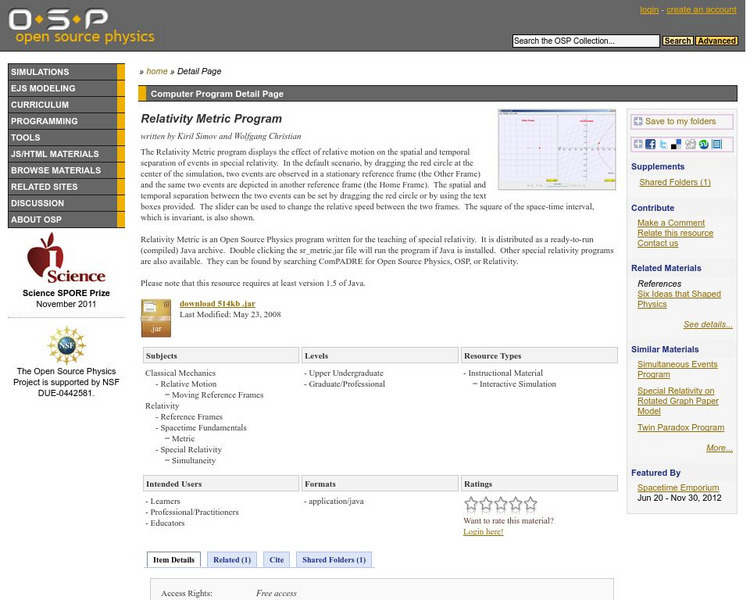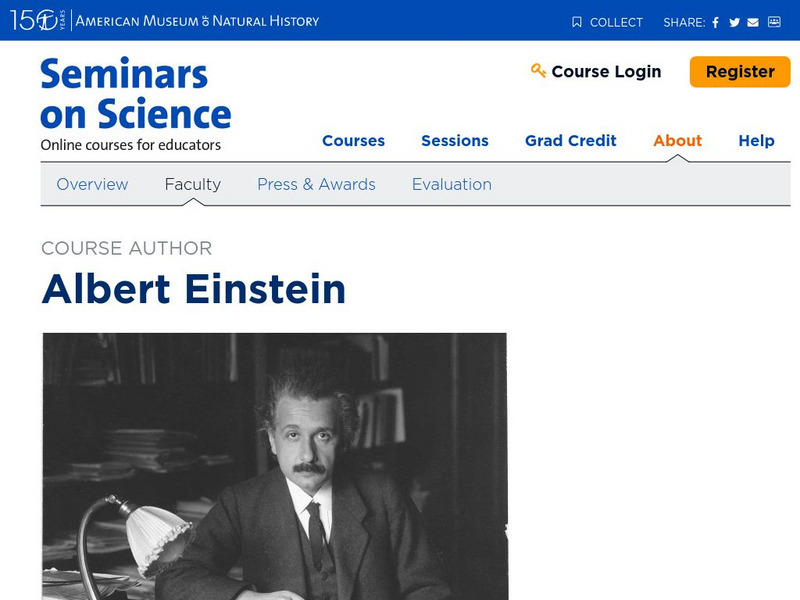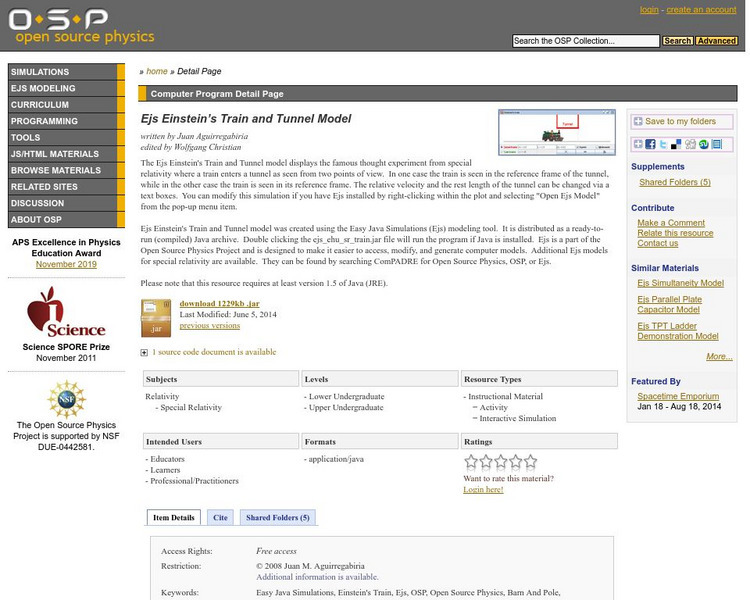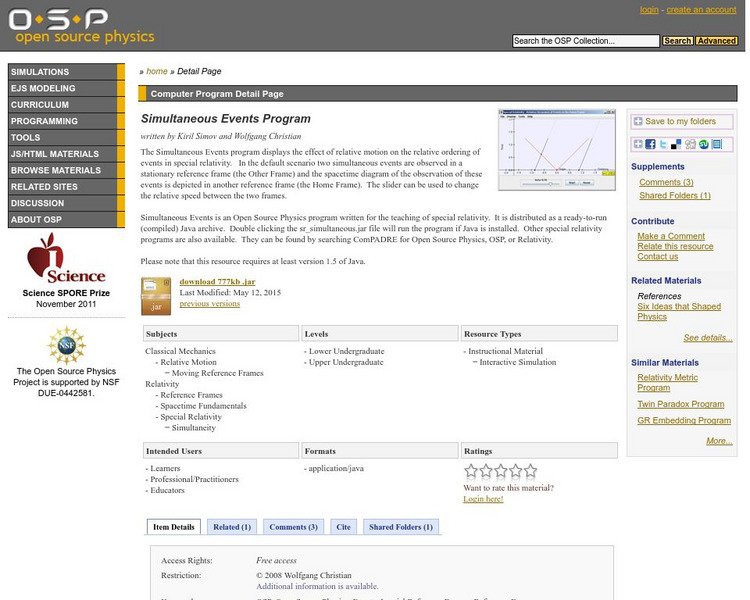Hi, what do you want to do?
Mocomi & Anibrain Digital Technologies
Mocomi: Theory of Relativity
Understand what relativity is and what Albert Einstein discovered while studying it. Identify special relativity and general relativity.
PBS
Pbs Learning Media: Einstein: A Timeline of His Life
This illustrated timeline from the NOVA Web site follows Albert Einstein's life, including 1905, his "Miracle Year," during which he developed his Special Theory of Relativity and the equation, E=mc2.
National High Magnetic Field Laboratory
Magnet Academy: Timeline of Electricity and Magnetism: 1900 1909
Albert Einstein publishes his special theory of relativity and his theory on the quantum nature of light, which he identified as both a particle and a wave. With ever new appliances, electricity begins to transform everyday life.
PBS
Pbs Learning Media: That's My Theory!
Become a game show contestant in this online activity from A Science Odyssey and ask a series of questions to a panel of mystery scientists, using the answers to determine which scientist is Einstein.
Ducksters
Ducksters: Physics for Kids: Theory of Relativity
Kids learn about the theory of relativity in the science of physics including examples, special vs. general, length contraction, and E=mc2.
American Association of Physics Teachers
Com Padre Digital Library: Open Source Physics: Relativity Metric Program
Graphical visualization of how the relative motion of two events affects their spatial and temporal separation in special relativity.
Stanford University
Stanford University: Conventionality of Simultaneity
This site from Stanford University is on the topic of simultaneity in relativity.
American Association of Physics Teachers
Com Padre Digital Library: Open Source Physics: Minkowski Diagram Model
Simulation examining simultaneity and causality in special relativity by manipulating the space and time coordinates of one or two events.
Wikimedia
Wikipedia: Albert Einstein
In this Spanish-language entry, grasp a concrete understanding of a complicated man whose discoveries impacted society more than any other scientist. This site chronicles the life and accomplishments of Albert Einstein. It also studies...
Massachusetts Institute of Technology
Mit: Open Course Ware: Courses: Physics: String Theory for Undergraduates
College-level physics course focusing on the string theory. The course develops the aspects of string theory and makes it accessible to students familiar with basic electromagnetism and statistical mechanics. Course features include...
Science Struck
Science Struck: Biography of Albert Einstein
The life and many accomplishments of Albert Einstein are detailed in this article. Includes descriptions of his scientific theories and contributions.
Massachusetts Institute of Technology
Mit: Open Course Ware: Exploring Black Holes: General Relativity and Astrophysics
College-level physics course focusing on black holes. Course topics include general relativity, astrophysics, and elements of cosmology . Course features include selected video lectures, lecture notes, assignments, and exams.
Other
Is the Speed of Light Constant?
Using a question and answer format, this page discusses the question: "Is the Speed of Light Constant?" Discusses some of the history and experiments performed with light and the conclusions drawn from those findings.
TED Talks
Ted: Ted Ed: The Fundamentals of Space Time: Part 1
In this first lesson of a three-part series on space-time, hilarious hosts Andrew Pontzen and Tom Whyntie go through the basics of space and time individually, and use a flip book to illustrate how we can begin to look at them together....
Science Struck
Science Struck: How Does Light Travel Through Space and Other Media?
A detailed discussion of the nature of light, how it can travel through a vacuum, and how the speed of light is affected when light travels through a medium.
National High Magnetic Field Laboratory
Magnet Academy: Sin Itiro Tomonaga
Japanese theoretical physicist Sin-Itiro Tomonaga resolved key problems with the theory of quantum electrodynamics (QED) developed by Paul Dirac in the late 1920s through the use of a mathematical technique he referred to as...
American Museum of Natural History
American Museum of Natural History: Profile: Albert Einstein
Read about the life and work of Albert Einstein, including details from his childhood and what he said about life just before he died.
Florida State University
Florida State University: Science, Optics & You: Albert Einstein
Biography of Albert Einstein (1879-1955), one of the most famous physicists of the last century, best known for his theory of relativity.
American Association of Physics Teachers
Com Padre Digital Library: Open Source Physics: Ejs Einstein's Train and Tunnel Model
A simulation of a well-known special relativity experiment of Einstein's, involving a train and a tunnel. Velocity and tunnel length can be altered to observe the effects.
Walter Fendt
Walter Fendt: Apps Zur Physik
This site, in German, offers numerous apps that illustrate common physics principles. Apps are organized into categories: mechanics, oscillations and waves, electrodynamics, optics, thermodynamics, the theory of relativity, physics of...
American Association of Physics Teachers
Com Padre Digital Library: Open Source Physics: Simultaneity Spacetime Diagram
Manipulate variables in order to observe the effects of relative motion on events such as an explosion and the time at which its light signal reaches a destination.
PBS
Pbs: Nova: Time Travel: Think Like Einstein
Addressed with questions about relative speed and the speed of light, students begin to "think like Einstein" while exploring the science behind the mystery of time travel.
BBC
Bbc Mundo: El Ano Magico De Einstein
A special feature on Einstein from the BBC, in Spanish. Follow Einstein's life, including his role in the development of the atomic bomb; learn about the impact and practical applications of his work; or watch a speech he gave in 1950...
American Association of Physics Teachers
Com Padre Digital Library: Open Source Physics: Simultaneous Events Program
Simulation showing how relative motion affects event order in special relativity. Manipulate the relative speed of two simultaneous events and observe the results.























